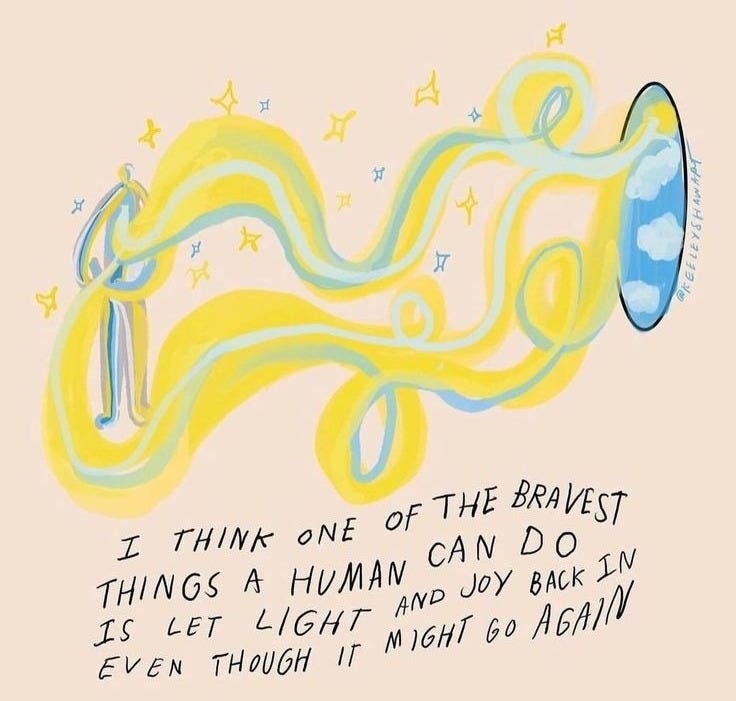
I’ve always prided myself in my openness and vulnerability. To be fair, much of the openness and vulnerability stems from years of intellectualizing my feelings, self-therapizing, and lots of real therapy (and maybe a deep desire to be perceived as authentic and real).
The genesis of this trait was likely the ritual of discussing weekly highs and lows and connecting to scripture, baring my soul in Sunday School in my childhood. Each Sunday morning, I recounted the troubles I had experienced that week to my peers without much fear. I am honestly not sure where that lack of fear and social anxiety (in this particular context) came from, but I suspect it was how free I felt and the insight I gained from my honesty. My Sunday School leaders and English teachers often praised me for my emotional openness and honesty, and I consequently saw my vulnerability as a virtue of sorts. I genuinely did not consider (or even realize) my openness about my traumas as something to be exploited by other people until the past few years.
A huge aspect of the flavor of Christianity I grew up with is sharing your testimony. The big picture of this is explaining how God has done good in your life, usually as a way to connect with other Christians. The reality of this concept in a highly performance-based culture is a retelling of an extremely vulnerable experience (often centered around a physical or mental health struggle, loss of a loved one, or sometimes a Christian taboo like sex, drugs, and alcohol) and how God “saved” you through the experience. The unspoken rule is the more intense your testimony, the more impactful your testimony comes across, and by the transitive property, the more likely sharing your testimony can convert someone.
Obviously, as a teenager in the throes of depression and anxiety with a tendency toward vulnerability, I had it in the bag. I hate to say it, but I was really great at “telling my story.” I made sure it checked all the boxes and followed a common narrative structure to a tee. Was I trying to be emotionally manipulative through my testimony? Hell no. But here I was, being assigned to be vulnerable and to retell some of my most severe traumas over and over and over to friends, acquaintances, and strangers.
Part of the exposition of “my story” was a bit of background on my family’s financial instability and the pressure that I have always felt as a result and how that mental burden exponentially escalated once my father lost his job. The majority of my peers were rich white kids who hadn’t really experienced traumas in a similar manner, and they ate up my story, declaring my testimony of transformation from darkness to light as powerful and miraculous. I wore those words as a badge of honor. I didn’t consider the social implications of the emotional mindfuck (excuse my French) I had subjected myself to.
About a year ago, I had a conversation with someone about the death of the American Dream and how the model minority myth uses the American Dream to perpetuate extremely harmful ideas in Asian Americans’ lives. Because the sociocultural academic perspective wasn’t enough to budge this person’s viewpoint (like what are we doing here), I succumbed to using pathos as a strategy. Surely, if I explain my lived experience, they will have at least a semblance of understanding.
Unfortunately, I wouldn’t be writing this if that strategy had worked. Even after illuminating just how intertwined this idea of an American Dream was with my family’s financial wellbeing and my mental health struggles, their stance did not budge. The nail in the coffin was a message of thanks for providing such an engaging thought experiment.
I was blown away by this response. What is it like to learn about poverty and financial instability and debilitating mental health struggles from the perspective of someone who has never felt its overwhelming burden? To move forward, without increasing in empathy or a willingness to entertain the possibility of a world where this harm is minimized? I thought about the folks from Sunday School and how they were enraptured by my experiences. What is it like to learn about white privilege, classism, sexism, homophobia, etc. without any firsthand experience of the resulting harm, pain, and death? What is it like to step into someone else’s shoes and have the privilege to take the shoes off after a mere 30 minutes?
My lived experiences are inextricably tied to who I am. To reduce those experiences to a thought experiment is a blatant show of disregard for my personhood.
These are unfortunately just two examples out of the many times I have experienced this pattern of vulnerability and exploitation. And I know I’m not alone in my experiences. After mulling over my thoughts on these instances, I can’t help but feel a mix of jealousy, fear, and confusion. I feel exploited for my vulnerability and my initial openness to sharing my pain and insecurities. I feel inclined to guard my heart and soul moving forward.
If you’re still reading this, that gut reaction of putting up emotional walls clearly did not succeed. Regardless, I have seen how the impact of these experiences has reverberated in my hesitancy to share who I am openly and honestly. I truly cannot envision a future version of myself who is afraid to jump into the emotional deep end, and I’m learning to be okay with that and see it for the good that it can do. Because of who I am and the world we live in, I am almost certain this pattern will continue, but the alternative—living life afraid to bare my heart and soul—is inconceivable.





